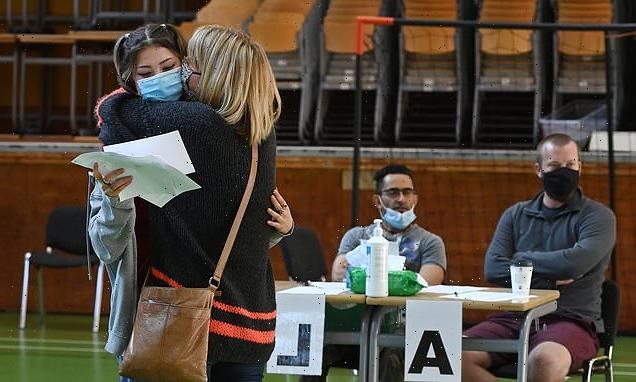Sharp rise in university dropouts due to inflated Covid A-level grades: Fears ‘teacher assessed’ exams did not prepare students for further education
- Students returning to the University of South Wales dropped for 2022-2023
- Grade inflation was said to be a cause, after pandemic teacher assessed exams
- Almost half of all A-Level grades -45 per cent- were awarded A or A* in 2021
Student dropouts at university have sharply risen following teacher assessed exams and inflated pandemic A-level grades, it has been warned.
A university reported that the failing of assessments and not submitting them at all has sparked a worrying decrease in those returning to university this year.
Dr Ben Calvert, vice-chancellor of the University of South Wales, told The Telegraph that the number of students returning for the 2022-2023 academic year dropped by 6.1 per cent.
Almost half of all A-Level grades– 45 per cent – were awarded A or A* in 2021 , compared with 39 per cent in 2020 and 25 per cent in 2019
University staff were alerted of the issue in an email which reportedly read: ‘We know that the suspension of A-level examinations and the so-called grade inflation from A-levels and other qualifications has had an impact; we also know that the trend of submitting only some assessments is mirrored in our local colleges.’
Grade inflation has come after the cancellation of exams due to the pandemic, meaning that teachers had a role in deciding and issuing grades.
Coursework, classroom performance and mini assessments were used as measures to reach these grade decisions, which gave students a number of opportunities to prove themselves.
Almost half of all A-Level grades– 45 per cent – were awarded A or A* in 2021, compared with 39 per cent in 2020 and 25 per cent in 2019.
The number of students returning for the 2022-2023 academic year dropped by 6.1 per cent at the University of South Wales, it was reported
Last year saw 43,000 young people without a guaranteed place at university – the highest number in a decade – partly influenced by a spike in applications
While it was promised that exams would return to normal, the need for certain allowances was stressed so that students would not disadvantaged compared with the year before.
But 2022 saw 43,000 without a guaranteed place at university – the highest number in a decade – partly influenced by a spike in applications.
Conservative MP Robert Halfon and chairman of the Commons education committee raised his concerns about the exam system to BBC Radio 4’s World At One programme in 2021.
He told them: ‘I do worry about the fact that we seem to have, in essence, baked a hard rock cake of grade inflation into our exam results and what we have to do to make sure is that our exams provide a level playing field, but of course… are recognised and valued by colleges, universities and employers.
‘I would have preferred a system which had some kind of standardised assessment.’
Tom Richmond, director of the EDSK [education and skills] think tank, also previously warned that the high proportion of top grades could ‘undermine the credibility’ of the results.
He said: ‘Even if awarding such high grades feels fair to some students, it may harm their long-term prospects when they apply for jobs in future,’ he said. ‘There is now a serious risk that this year’s grades are simply meaningless in the eyes of employers and universities.’
However, in 2022, top A-level grades took the biggest drop ever registered in the 70-year history of the qualification.
This was despite the supply of ‘cheat sheets’ and extra leniency due to Covid disruptions.
Dr Jo Saxton, the Chief Regulator of Ofqual, confirmed that 2023 will return to ‘pre-pandemic grading as the next step in getting back to normal’.
‘We expect that overall results in 2023 will be much closer to pre-pandemic years than results since 2020,’ it was stated.
A-Level results day in 2023 will be held on August 17.
EXAM RESULTS IN 2021
44.8 per cent of subject entries were awarded either an A or A*, up from 38.5 per cent in 2020 and 25.2 per cent in 2019.
19.1 percent of entries received an A*, up from 14.3 per cent in 2020 and 7.8 per cent in 2019.
99.5 per cent Overall pass rate – A* to E, slightly down from 99.7 per cent in 2020.
88.5 per cent received a C or above, up from 88 per cent in 2020 and the highest rate since at least 2000.
70.1 per cent of grades at private schools were A or A* – compared with 42 per cent at state-run academies.
28.1 per cent: The percentage point gap at A and A* between entries from private schools and academies, compared to 24.6 in 2020 and 20.3 in 2019.
46.9% per cent: The proportion of entries by girls which scored A or higher. It is 4.8 percentage points higher than boys (42.1 per cent). Last year, girls led boys by 3.2 percentage points (39.9 per cent girls, 36.7 per cent boys).
3.6 per cent: Rise in entrants for maths, which was taken by 97,690, from last year – making it the most popular subject this year.
35,268 Geography saw the biggest percentage jump in candidates of any subject with more than 1,000 entrants, rising by 16.8 per cent from 30,203 to 35,268.
435,430 people from the UK and overseas were accepted on to university courses, up 5 per cent on last year.
388,230 among UK applicants have been accepted, an 8 per cent rise compared with last year.
50 per cent: Drop in students from the European Union taking up courses – 9,820 compared with around 22,000 last year.
8 per cent: Increase in students accepted on to nursing courses from last year, up to 26,730.
Source: Read Full Article



